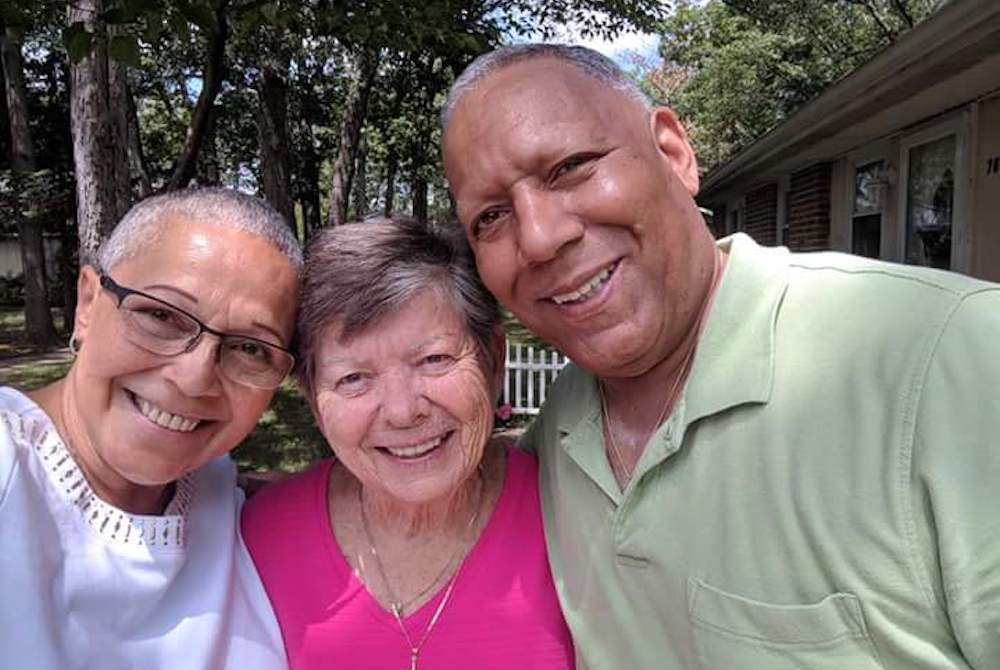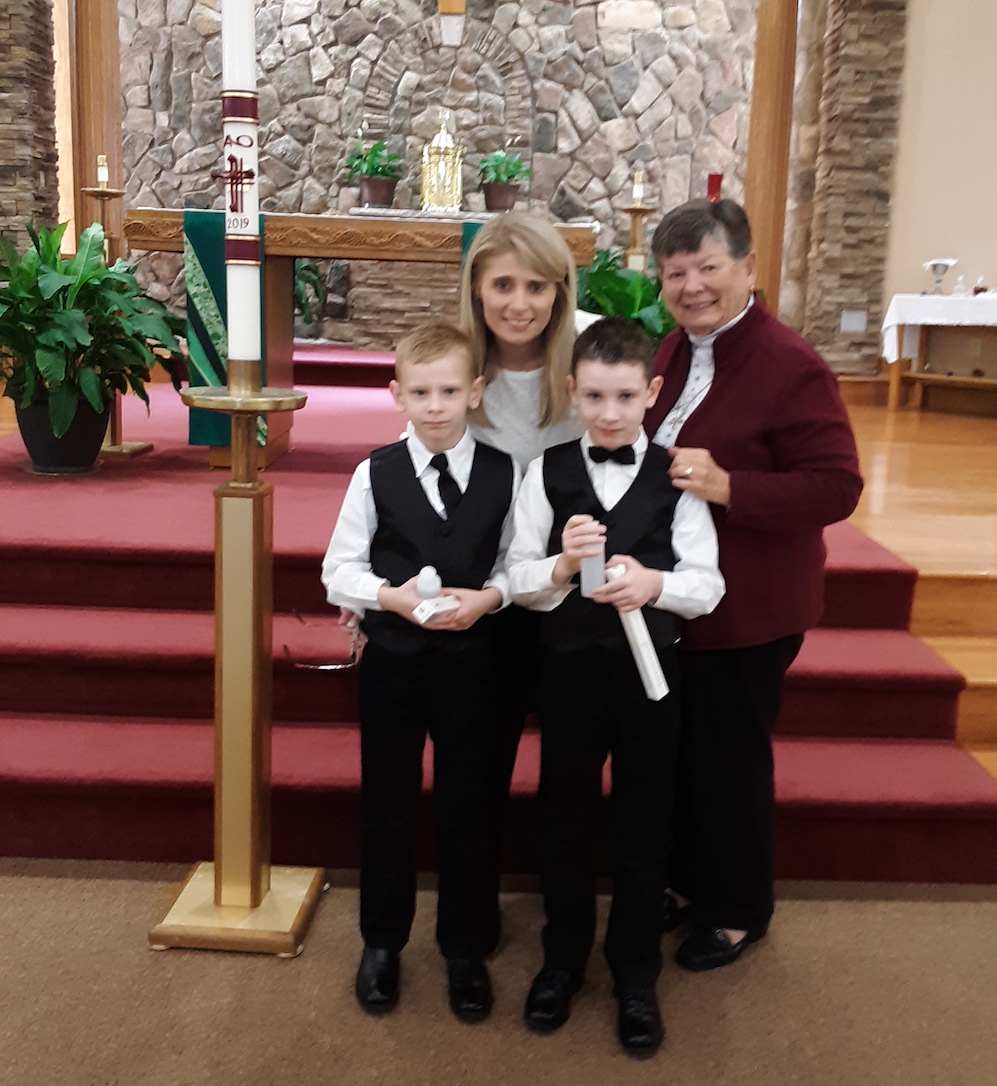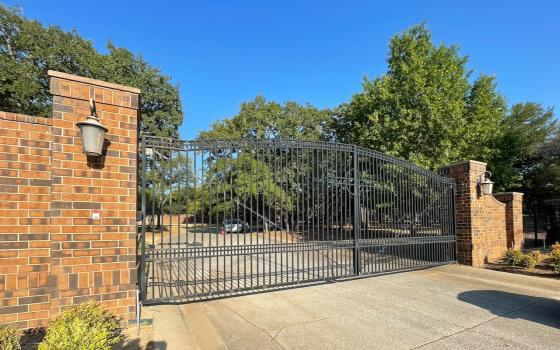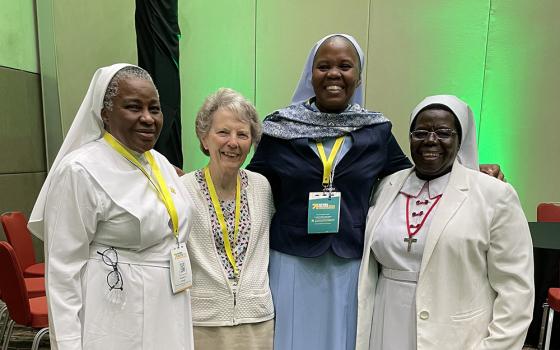
Dominican Sr. Liz Engel, center, met Liddy Olano, left, at St. Dominic's Home, an orphanage in Blauvelt, New York, Engel's former ministry. "I call Liddy my daughter. She relates to me as her mother, and her daughter relates to me as a grandmother. They know me as a sister, but I give them that," Engel said. Because Olano was never legally freed for adoption after her only parent died, Engel assumed that role unofficially. Olano met her husband, Joseph, right, at an event for the home's alumni. (Courtesy of Liz Engel)
Though Dominican Sr. Liz Engel has long been concerned about the need to place children in adoptive families rather than foster care, the ongoing pandemic has heightened the stakes.
The coronavirus has complicated the travel necessary to fulfill her ministry in cross-state adoptions, but it's also put foster children at risk. A demographic that's already prone to neglect, the kids are in foster homes that now can't be monitored as easily, and the current financial desperation of many has families seeking the check that comes with being a foster parent, no matter how unqualified they may be.
"It's becoming a very big crisis," she said.
Before dedicating her life to the ministry of adoption, Engel knew she was called to work with homeless children — a call that deepened when she joined the Sisters of St. Dominic of Blauvelt, New York, an order with close ties to orphanages that encouraged her former ministry of running a group home for girls experiencing homelessness in the Bronx, New York.
"Between my brother and myself, our bend was always to look after homeless children," said Engel, whose family adopted a 16-year-old boy in the 1970s.
In 1967, her brother, a Capuchin priest, helped a young man experiencing homelessness (who is now a Franciscan priest) by finding a home for him with a woman named Margaret Downey — the unofficial start of Downey Side, now an adoptive agency in White Plains, New York.
Engel joined the agency in 1999. Now, she is the executive director of Downey Side, the only national adoption agency exclusively devoted to recruiting and certifying permanent families for youth ages 7 to 17. The agency's focus is on adopting children who are older, members of a minority group, physically and/or intellectually disabled, or part of a sibling group (in which case, they work with those as young as 2), often connecting them with families in other states.
"Once the child comes from another state and is placed in a Downey Side family, we're like the middleman; we have to take care of the child up until adoption," Engel said, noting it's a six- to seven-month process. In the agency's 54 years, Downey Side has placed over 8,000 children.
But they're also on another mission: "We're out to try to end foster care of children because it's killing them," she said, pointing to the agency's recent book, America's Youngest Hostages, which aims to raise awareness around the risks of foster care.
Advertisement
GSR: Tell me more about the dangers of foster care and why you want to end it.
Engel: America is not aware of what goes on in foster care. They're not aware of their money that is spent in foster care rather than in permanency.
[Since joining Downey Side,] there's been more of a focus on getting children out of foster care, and that's based on the stories that children who have been placed have told us. I'm not saying every foster family is not good, but the majority do it for the money. The money is very good to be a foster parent — better than it is for adoptive parents.
A child is put into foster care when the biological parent is unable to care for them. They're removed from the biological home. Incarceration, domestic violence and drug abuse are the three biggest reasons for why a child is removed. They're placed with foster parents, and many of the foster parents, because it's not permanent and because maybe they have other children, these children do not feel loved. They feel abandoned by their biological parents. They're not treated the same way.
One boy was in a foster home with six other foster children. They were drugged and kept in the bedroom, sleeping all the time, and they were only allowed in the the main section of the house periodically. But the main section was all stone and beautiful. So, these children were drugged and they were kept in beds half the day, and the money they got they used to fix their house.
How has COVID-19 affected your ministry? Have you seen how it affects the children or how it's complicated placement?
Big time. It's complicated placement a lot because of not being able to travel from one state to another, and most of our children come from other states. They might be a good match for a family we have, but the holdup is COVID. Just this week, we placed a child who was waiting to move here over a year ago because of COVID.

Dominican Sr. Liz Engel, right, with two brothers and their adoptive mother at their first Communion in November 2019. The boys now live in New York after being adopted from Texas. (Courtesy of Liz Engel)
Fewer workers are going out [to monitor the foster homes because] they're working from home, but a lot of these children need to be monitored, they need to be checked on. In New York City alone, children have been found dead because of the lack of care for these children who are stuck in their family homes, and there's no workers out there to get them into a better home or even a good foster home. We're not aware of this; I wasn't even aware of that fact. But I can understand, and with COVID, people are desperate, people will take in children if they're not working and don't have enough. They should be screened better.
In our office here in New Jersey, we have over 13 families in the process of wanting to adopt, which is more than we've ever had at one time. And we can't figure out how now, with COVID going on, there are so many families that have come out to adopt. We also decided that maybe they were all sitting home and saying, "We want children in this house." We don't know why. New York is not the same, though; our New York office does not have a lot of families, and down here, we're loaded with families.
Are there other misconceptions people have around adopting older children or of the children in foster care that you've learned through this ministry?
I would say 95% of the children are so happy and treated so well. You have no idea of the joy in this child and in the family when they are placed. They get a room, they get to decorate a room, things normal children do. I cry at every adoption because I know what they went through.
It's wonderful work, and I'm so happy to be in a community of sisters who value taking care of these children. That's why I entered the order, in fact, because of their work with homeless children.
How has this ministry affected your spirituality?
St. John of the Cross wrote a quote that I've always kept very close to my heart: "Where there is no love, put love, and you will find love." And I feel strongly that that is a good example of what we can do through adoption. They have no love in their lives — we find parents who want to love them, and they receive it.
All I can tell you is what parents tell me when I say, "You know, you've made a difference in this child's life" — they'll turn around and say, "That child has made a difference in our lives."
And that's true.








